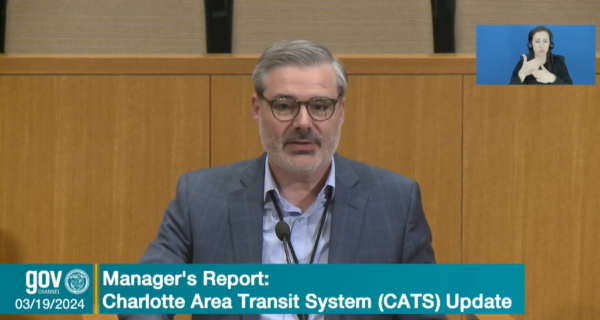CATS’ customer service improves, operator vacancies are down

This week, the Board of County Commissioners held one of their bi-monthly meetings. There were several items on the agenda, including an opportunity for the public to speak directly to commissioners, committee appointments, and consent items. However, the majority of the meeting was an update from Charlotte Area Transit System (CATS) interim CEO, Brent Cagle. Couldn’t make the meeting? Here’s a recap!
Key takeaways
- Bus operator vacancies have improved from 20% to 10% over the past year.
- CATS services are used predominantly by minority and low-income residents, 51% of whom do not own a car.
- In order to meaningfully improve bus route efficiency and reliability, the region will need to secure additional funding, most likely through a sales tax.
- CATS staff will give a presentation to county commissioners each year going forward.
Read on for more information on each of these items and more!
CATS Update
Cagle explained that CATS serves the entirety of Mecklenburg County and even some residents in surrounding counties, totaling 675 square miles served. Annual total ridership (ie, number of rides) last year was roughly 14 million, with 70% of those riders identified as people of color and 40% as folks who earn less than $30k each year. In other words, CATS services are used predominantly by minority and low-income residents, 51% of whom do not own a car.
He also highlighted CATS’ accomplishments over the past year. He shared that CATS focused on the customer experience by doubling security personnel at CATS facilities, creating a program called CATS Connect to help people in need, and launching an Ambassador Program to assist customers with general questions so transit operators can stay focused on their job. On the maintenance side of things, CATS continued light rail truck maintenance, replaced 30 buses, and saw the vacancies in bus operators improve from 20% to 10%.
Finally, Cagle addressed several projects in CATS’ Capital Plan. He confirmed that conversations are ongoing with Norfolk Southern to find a solution for the future Red Line while a redesign project is identifying station locations and solidifying the rail line’s alignment into Uptown. He also shared that a bus rapid transit (BRT) program from Huntersville to Uptown is expected to start construction in 2026. This BRT program will come with a Park & Ride station called Hambright and will allow buses to use the I-77 express lanes, cutting travel time by 15-20 minutes.
After Cagle’s presentation, commissioners had a chance to ask questions. Several of the questions were about microtransit, improving the efficiency of bus routes so people do not have to transfer, and the unreliability of the Village Rider service in the northern Mecklenburg towns. Here are his responses:
- Microtransit: This is an option to serve areas of the county that are very difficult to service with fixed-route buses. Oftentimes, the density of development and road networks in these areas cannot accommodate buses. There will be zones where microtransit is available, and residents who request a ride must select both their start and end destinations within the zone. CATS will likely contract with a company for this service to test it out before operating it as a CATS-led service.
- Efficiency of bus routes: Cagle agrees that we need reliable, frequent service for people to choose transit. In order to change the “hub-and-spokes” system that CATS currently has – which requires bus riders to travel into uptown to transfer to another bus that will take them to their destination – the region will need to secure additional funding through a sales tax. Only with additional funding can substantial system-wide changes can be made.
- Village Rider: This service is often unattractive for riders because the schedule doesn’t line up with other express bus route schedules that take residents into Charlotte. The bus rapid transit program expected in 2026 will make this service more attractive and reliable than it is currently.
The Board of County Commissioners expressed their gratitude for Cagle’s presentation and invited CATS staff to return annually with updates.
Watch the meeting recording here.
THANKS FOR READING!
As a nonprofit, community support is essential for us to keep doing what we do — including providing free articles like this. If you found this article helpful, please consider supporting Sustain Charlotte.
Want to stay in the loop? Subscribe to our weekly newsletter and follow us on Instagram, Facebook, and Twitter.
